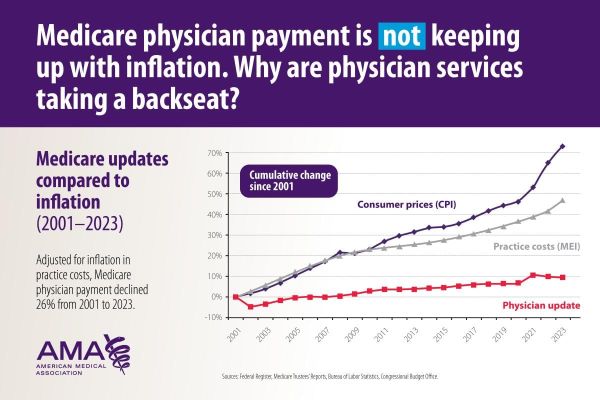
As part of a broader push for Medicare payment reform, the Texas Medical Association, along with the American Medical Association and 133 national specialty and state medical associations, recently called on Congress to index Medicare physician payments to inflation.
“Congress has a real opportunity to relieve the financial strain on Medicare physicians and strengthen access to care for current and future generations of Medicare beneficiaries,” they wrote in a March 15 letter to House and Senate leaders. “We urge you to answer that call.”
Specifically, TMA and the other signatories asked Congress to pass legislation implementing an annual, inflation-based payment update based on the full Medicare Economic Index (MEI), a measure of physician practice cost inflation.
Their request comes on the heels of a similar recommendation from the Medicare Payment Advisory Commission (MedPAC), a key congressional advisory panel, which voted in January to support increasing Medicare physician payments for the first time in several years. But MedPAC notably only recommended raising payments by 50% of the projected increase in the MEI.
“We commend MedPAC for taking this significant step,” TMA and the others wrote. “However, we feel strongly that implementing an inflation-based update based on only half of the full MEI growth rate would be a missed opportunity to meaningfully address this perennial issue of Medicare physician underpayment that threatens stable access for millions of Medicare beneficiaries.”
Zeke Silva, MD, a radiologist in San Antonio and a member of TMA’s Council on Legislation, says it’s critical Medicare physician payment is tied to the MEI. He also chairs the AMA’s Relative Value Scale Update Committee, which makes payment recommendations to Medicare.
“Physicians are paying more for supplies, equipment and staff,” he recently told Texas Medicine. “Accommodating these increased costs requires, by definition, increased payment.”
Dr. Silva also notes MedPAC historically has been slow to recommend Medicare physician pay adjustments.
“The fact that they would come in and collectively make the statement that all physicians caring for Medicare [patients] should receive a 1.25% increase is significant,” he said. “But the amount is not enough.”
Between 2001 and 2023, Medicare physician payments decreased by 26% when adjusted for inflation, whereas Medicare payments for hospitals and other health care facilities generally have kept pace with inflation, according to AMA. Over the same period, the consumer price index for physician’ services in U.S. cities increased 65%.
In their letter, TMA and the other signatories argue this disparity could prove disastrous for Medicare patients’ access to care, among other consequences.
The lack of an annual inflationary payment update for Medicare physician payments “compounds the financial uncertainty and budget challenges for our nation’s physician practices, with a disproportionate impact on those that are small, independent, rural, or serving high-needs patient populations,” medicine wrote. “The increasing discrepancy between what it costs to run a physician practice and actual payment, combined with the administrative and financial burden of participating in Medicare, is incentivizing market consolidation, which can increase health care costs.”
For these reasons, medicine is pushing for systemic reform of the Medicare physician payment system. To this end, TMA has endorsed a set of AMA principles, the cornerstone of which is an annual inflationary update. The Characteristics of a Rational Medicare Physician Payment System also call on Congress to:
- Eliminate, replace, or revise budget neutrality requirements;
- Incentivize value-based care that suits various practice settings; and
- Support physician efforts to reduce health disparities.
Emma Freer
Associate Editor
(512) 370-1383